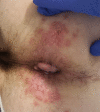A 40-Year-Old Man with Anemia, Proctitis, Rectal Bleeding, and a Perianal Rash Due to Mpox (Monkeypox) Infection
- PMID: 37660250
- PMCID: PMC10483884
- DOI: 10.12659/AJCR.940177
A 40-Year-Old Man with Anemia, Proctitis, Rectal Bleeding, and a Perianal Rash Due to Mpox (Monkeypox) Infection
Abstract
BACKGROUND A recently described zoonotic viral infection, mpox (monkeypox), is an Orthopoxvirus transmitted by close contact, which causes symptoms similar to smallpox, although less severe. This report presents the case of a 40-year-old man with anemia, proctitis, rectal bleeding, and a perianal rash due to mpox infection. CASE REPORT A 40-year-old man with a medical history of human immunodeficiency virus (HIV) and syphilis presented multiple times with progressive and painful perianal lesions. On initial presentation, swabbing of the lesions and polymerase chain reaction (PCR) testing confirmed a diagnosis of mpox infection, and treatment with a 14-day course of Tecovirimat was started. Nine days after initiating Tecovirimat, the patient presented again with worsening perianal pain and associated hematochezia resulting in acute symptomatic anemia. Despite a blood transfusion to treat his anemia, the patient's status declined as his viral symptoms progressed. Computed tomography (CT) investigation demonstrated significant proctitis with interval development of small perianal abscesses. A multidisciplinary approach for medical management and treatment was instituted. The resolution of the patient's anemia and mpox proctitis was confirmed on follow-up. CONCLUSIONS Despite treatment with antiviral agents, mpox infection can progress quickly; thus, swift management with a multidisciplinary approach and close follow-up is needed to treat and prevent secondary complications such as anemia and proctitis. Further data collection regarding the sexual practices of those with diagnoses of mpox as well as seminal, anorectal, and genital swabbing would be valuable to confirm the mode of transmission and cause of mpox proctitis.
Conflict of interest statement
Figures


Similar articles
-
Mpox Case Presenting With Genital Lesions and Proctitis.Am J Dermatopathol. 2024 Apr 1;46(4):243-246. doi: 10.1097/DAD.0000000000002643. Am J Dermatopathol. 2024. PMID: 38457670
-
Case report: atypical presentation of mpox with massive hematochezia and prolonged viral shedding despite tecovirimat treatment.BMC Infect Dis. 2024 Feb 12;24(1):183. doi: 10.1186/s12879-024-09098-2. BMC Infect Dis. 2024. PMID: 38342913 Free PMC article.
-
Anorectal Manifestations of Treatment-Refractory Monkeypox Requiring Surgical Intervention.Am Surg. 2023 Dec;89(12):6370-6373. doi: 10.1177/00031348231177931. Epub 2023 May 15. Am Surg. 2023. PMID: 37186888
-
Mpox gastrointestinal manifestations: a systematic review.BMJ Open Gastroenterol. 2024 Jan 6;11(1):e001266. doi: 10.1136/bmjgast-2023-001266. BMJ Open Gastroenterol. 2024. PMID: 38184298 Free PMC article.
-
Mpox: Rapid Evidence Review.Am Fam Physician. 2023 Jul;108(1):78-83. Am Fam Physician. 2023. PMID: 37440743 Review.
References
-
- World Health Organization (WHO). Fact sheet. Mpox (monkeypox). Apr 18, 2023. Available at: https://www.who.int/news-room/fact-sheets/detail/monkeypox.
-
- Moore MJ, Rathish B, Zahra F. StatPearls [Internet]. Treasure Island (FL): StatPearls Publishing; 2023. Mpox (Monkeypox) [Updated 2022 Nov 30]. Available from: https://www.ncbi.nlm.nih.gov/books/NBK574519/ - PubMed
Publication types
MeSH terms
Substances
LinkOut - more resources
Full Text Sources
Medical

